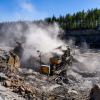News
Displaying Results 1 - 25 of 50
With its strong mining industry, mountainous areas and high seismic hazards, prevention and preparedness for disasters and climate change adaptation are high on Tajikistan’s agenda. In particular, the increasing frequency and severity of weather events due to climate change can undermine the safety…
UNECE Resource Management Week 2024 spotlighted the growing roles of the United Nations Framework Classification for Resources (UNFC) and the United Nations Resource Management System (UNRMS) in promoting sustainable development through enhanced integration and effective management of natural…
The raw materials sector is at the forefront of global challenges and opportunities of the 21st century, as it plays a vital role in the energy, transport, and digital transitions required to mitigate and adapt to climate change. However, the sector also faces significant pressures from consumers,…
Transparency in the environmental performance of economic activities and effective public access to environmental information, especially on products, are indispensable in addressing pressing environmental challenges. This also supports a just transition towards a green and circular economy,…
The Mediterranean Region, home to over 510 million people, is an important crossroads for economic, social and cultural exchanges between Europe, Africa, Asia and other continents. The region is rich in biodiversity, but has come under pressure due to the intensive exploitation of mineral resources…
UNECE and partners are working together to support North Macedonia in its green energy transition by building capacities to finance energy efficiency (EE) and renewable energy (RE) projects.
To this end, UNECE and UNDP organized two training sessions on design and verification of energy…
UNECE and partners have started implementation of a multi-year project on “Improving the energy efficiency of the global building supply chain industry and its products to deliver high performance buildings” (full project budget EUR 19.8 million), funded by the International Climate Initiative (IKI…
While underground coal mining in Albania stopped almost wholly (except for two private mines with a very insignificant output) more than 15 years ago, the abandonment of the mines from the 1990s onwards with no proper plans for closure has left a legacy of risks. These include water contamination,…
Young professionals from industry, academia, and civil society came together to discuss and explore solutions for sustainable resource management at the UNECE Resource Management Week 2023. Hosted by the UNECE Resource Management Young Member Group (RMYMG), the highly interactive session provided a…
In a move towards sustainable resource management, several countries have presented case studies of how the United Nations Framework Classification for Resources (UNFC) can scale-up harmonized resource management. UNFC provides a common language and standards for the classification of all energy…
Countries are increasingly facing multiple interlinked environmental, social, economic and health challenges – climate change, pollution from chemicals and wastes, biodiversity loss and species extinction, deforestation, land degradation, emerging zoonotic diseases, and the impact of armed…
Prevention of and preparedness for industrial accidents require special attention in Tajikistan, a country with a strong mining industry. The mountainous terrain of mining sites makes them highly susceptible to earthquakes, mudflows and floods, which can provoke Natech events (natural hazards…
Significant energy price increases arising from the war in Ukraine are having a negative impact on food production capabilities and costs in Georgia, especially in rural areas. This threatens to weaken the competitiveness of producers and increase their vulnerability to poverty. Reducing energy…
Electrification of vehicles is an important tool to align the transport sector with a climate neutral future and achievement of the Sustainable Development Goals (SDGs). Focused on climate actions, this year’s annual session of UNECE’s Inland Transport Committee (ITC) agreed on dedicated actions to…
Decarbonizing industry remains a key challenge for climate action: according to the International Energy Agency, industrial activity was directly responsible for emitting 9.4 Gt of CO2 in 2021, accounting for a quarter of global emissions (not including indirect emissions from electricity used for…
This year marks the 30th anniversary of the UNECE Convention on the Transboundary Effects of Industrial Accidents. This unique international legal instrument, signed on 17 March 1992 and in force since 2000, helps to protect people and the environment from the devastating effects of industrial…
In the face of rising prices of food and energy, and the persistence of the climate crisis, the sustainability of food systems is an issue of increasing global attention. While meat production provides an essential source of nutrition, and an important source of income for farmers, its impact on…
Accidental water pollution, which can be sudden and heavy as a result of industrial accidents, endangers people and the environment where chemical activities take place near a river, lake or water body. Accidental water pollution events can be triggered by natural hazards, such as floods, lightning…
As Ministers from across the UNECE region gather in the Cypriot capital of Nicosia to outline new initiatives to work towards a sustainable and ecological future at the 9th Environment for Europe Conference (5-7 October), the final report on the Batumi Action for Cleaner Air (BACA), adopted 6 years…
The United Nations Framework Classification for Resources (UNFC) is now published in Hungarian. This version, alongside recently published editions in Greek and Portuguese, will support policymakers to implement enhanced sustainable resource management in the UNECE region.
UNFC is universally…
Critical Raw Materials (CRMs) - such as lithium, nickel, copper, cobalt, manganese, graphite and rare earth elements - are essential to deliver on the Paris Agreement and Sustainable Development Goals (SDGs). In the build-up to COP27, UNECE and partners are mobilizing to address the challenges of…
How to step up environmental protection, reduce resource use, cut pollution and foster the shift to a circular economy that is needed to make sustainable development a reality? These will be some of the topics at the core of debates when Ministers from the 56 countries of the UNECE region gather in…
The extreme heat and drought that the region experienced this summer is a bleak reminder that current commitments under the Paris Agreement and those made last year at COP26 are nowhere near what is needed to limit global warming to below 1.5°C. Inaction is a policy choice that will lead to greater…
Building resilient energy systems to address the ongoing global energy crisis will be top of the agenda of the upcoming Sustainable Energy Week (19-23 September). Representatives from UNECE's 56 member States will discuss how to ensure energy for optimal social, economic, and environmental…
The United Nations Framework Classification for Resources (UNFC) is now published in Greek and Portuguese. These translations will support policymakers to implement enhanced sustainable resource management in the UNECE region.
A universally acceptable and internationally applicable scheme for the…

























